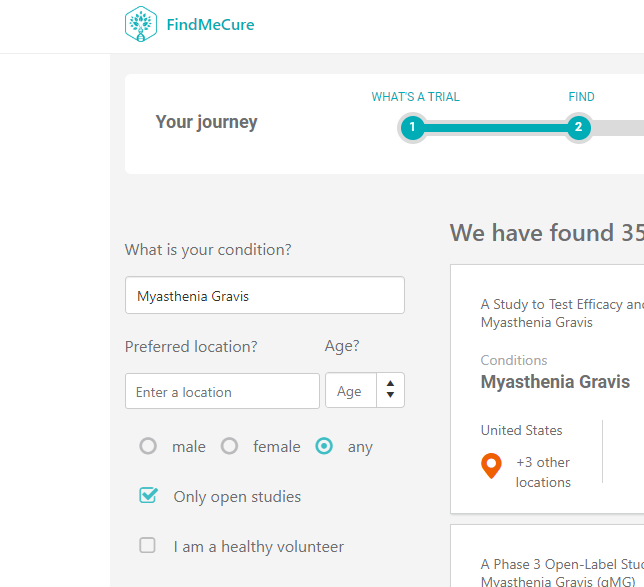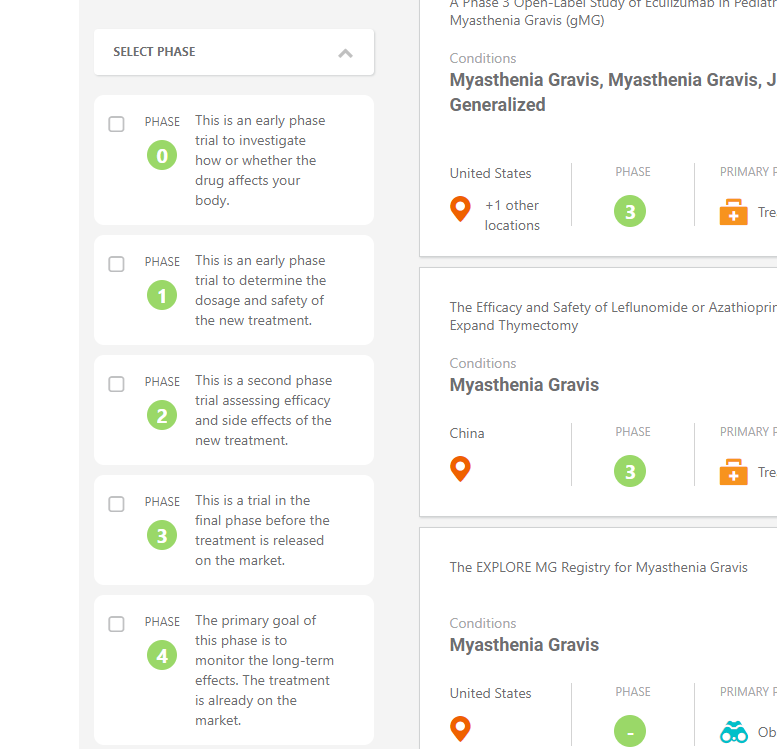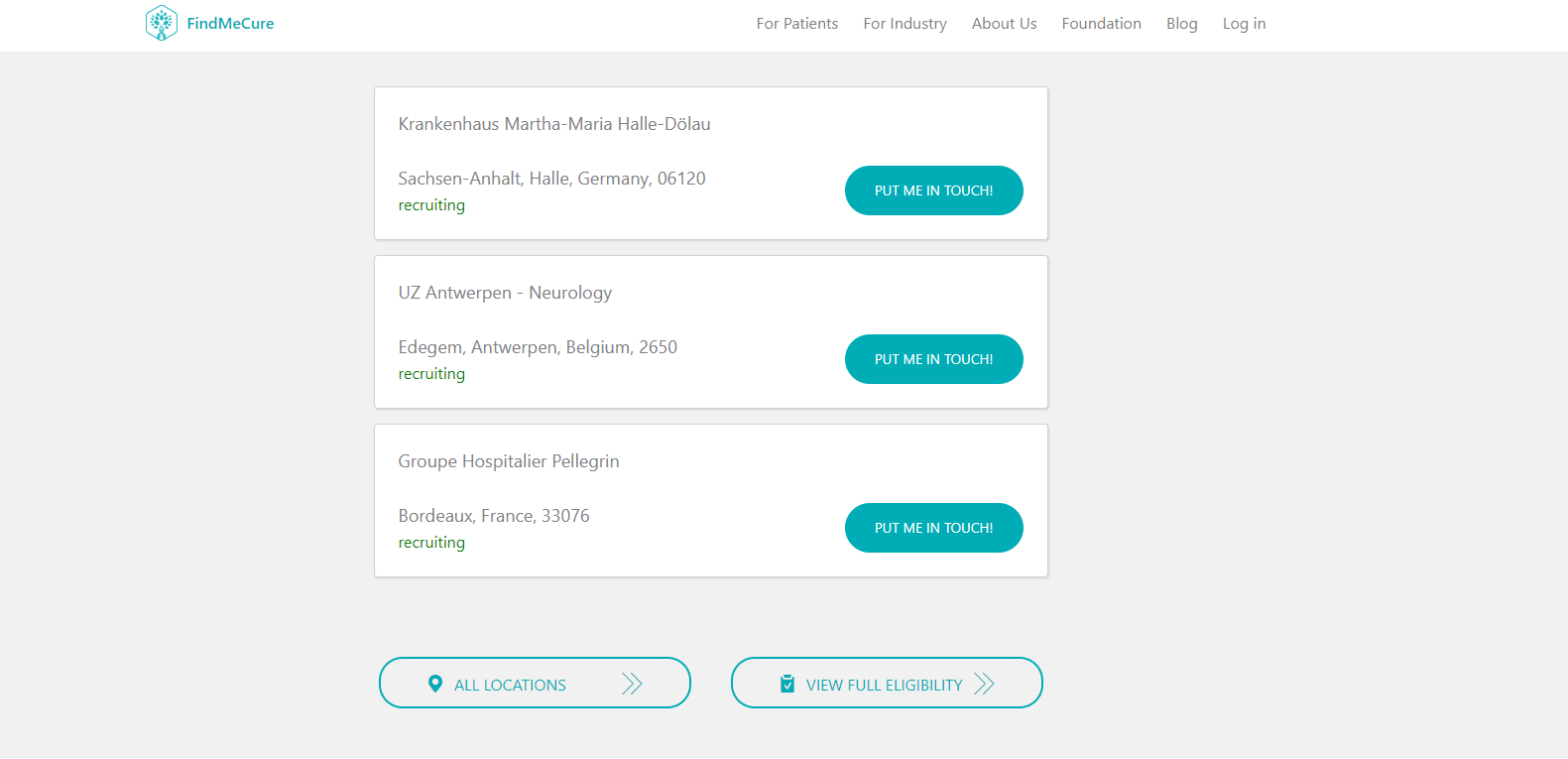How to Apply for A Clinical Trial On FindMeCure

With 85% of patients unaware of clinical trials as an option at the time of their diagnosis, according to the NIH, it’s a shame that many parts of the application process are still needlessly complicated when a patient is aware and motivated. FindMeCure was founded with the mission of spreading awareness and making the process of finding and applying for a trial easier on patients.
Yet, there is only so much that can be done to simplify the path to accessing treatments in development. Certain things patients learn as they go and there can be some frustrating obstacles along the way. We provide support throughout the whole process – from searching for the right trial to getting in touch with the trial coordinator. However, there are things to be taken into consideration and today on the blog we’re going to walk you through finding and applying for the clinical trial you’re interested in.
How to search for relevant trials
You found our platform on social media or through a friend or a patient organisation, or maybe even your doctor recommended it. But now that you are here, how do you actually use the platform to find relevant clinical trials?
The first thing you need to do is enter your condition under “What is your condition?”. You can also search by keyword if you were made aware of a particular study that you want to get involved in. A good example of a keyword is the treatment you know they are testing.

If you are not aware of any particular clinical trials and just want to see what is out there, entering your condition is enough. Then, enter your gender and age because these can be relevant for some studies. For example, if you are looking for treatments in development for infertility some studies will only be interested in female infertility while others will only accept male participants.
To find trials nearby you also want to enter your location. If you do not do that, the platform automatically shows you trials near you whether you are on vacation or visiting your parents in a different state or city. So enter your permanent location as you will most probably need to visit the research centre at least a few times during the trial.
What if there are no trials near you
If the nearest trial to you is in a different state or in a different country you still have a few options. The first one is to check again for trials nearby in a few weeks. You never know (and we cannot predict this either) when a new trial is supposed to begin so if you have the time to wait, check again in a few weeks.
The second option is to travel to the nearest research centre for visits. An increasing amount of clinical trial sponsors understand that in order to reach remote participants they need to reimburse their travel costs so there is a chance that your expenses related to travel (and sometimes accommodation) will be covered by the trial. As we do not conduct the trials and we are not involved in them, we cannot tell you in advance if your travel costs will be reimbursed or not. The only way to know this for sure is to get in touch with the coordinator of the trial and ask.
We don’t recommend applying for a trial which will require you to travel to another continent. If you live in the USA for example and the only clinical trials currently available to you are in France, Spain and Portugal there are going to be more obstacles in your way than if you were to apply for a local study. For one thing, all of the documentation (including the consent form) that needs to be provided to the patient will have to be translated. There are also some variations in the regulations from one continent or country to another. This is not to mention the travel which may or may not be reimbursed.
We believe that clinical trials are moving toward a more virtual design that allows for patients in remote locations to take part and access novel treatments for their condition. However, most clinical trials today are conducted in the traditional way and they require visits to the research centre where the medical team is.
Other features
There are other options to choose from on our platform. You can select what phase you want to take part in. We explain all about the phases of a clinical trial on our blog but in short, the goal of Phase 2 is to assess efficacy and side effects, while Phase 3 is the last one before the treatment becomes widely available and it usually involves comparing the new treatment against another, well established one.

From Primary purpose of the trial, you can select whether you want your condition to be treated or observed. We go into detail about what each primary purpose means on the blog so make sure to read more about it. However, if your goal is to find a treatment that alleviates your symptoms better and improves your quality of life you should probably select just that – “Treatment”.
You do not need to Select treatment in order to find relevant clinical trials. However, if you want to know more about the different kinds of treatments that can be tested in clinical trials we also have a blog post about it. Not to make matters more complicated but the kind of treatment that is most likely to benefit you also depends on your condition – a biologic can be a great option for autoimmune disease while people with insomnia might benefit from behavioural treatment. If you are not sure what to select, we advise you not to select anything or ask us for support via the chat.
Look at the eligibility criteria
You can quickly check if you are eligible for a trial you’re interested in by clicking on the “View full eligibility” button on the trial page. This is important because it would be a waste of your time and effort to apply for a trial you are super motivated to take part in only to receive an email that you are not eligible due to taking a certain medication or not being a veteran, for example.

In most cases, the eligibility criteria are easy to understand and you will be able to quickly determine if you are eligible or not. Sometimes, however, only the team in charge of the study will be able to assess whether the trial is a good fit for you once they have more of your medical information.
Talk to a doctor you trust
You don’t need to talk to your doctor in advance in order to start searching for clinical trials, nor do you need the help of a doctor to find a trial relevant to you. However, sometimes certain trials require a doctor’s referral in order to enrol you and in this case you will need to inform a doctor you trust and can freely talk to about multiple options. This is especially the case in Europe but it’s not uncommon for trials taking place in America to ask for the patient’s doctor to get involved in some way.
We don’t know in advance if any given trial will require a doctor’s referral but getting your doctor on board is never a bad idea. They will be able to answer more of those questions that we cannot about medical interventions or hypotheses.
You can start searching for a trial right away if you have a confirmed diagnosis and you can ask for help at any part of the process.

